Yves here. It’s telling, in not a good way, that alleged poisoning of the Skripals is still rattling around as a not settled matter, when the authorities were so definitive about the dastardly-Russians-did-it-with-Novichok version of events. But having thwarted a trial, the authorities seem determined to gut even a public inquiry, by denying access to the Skripals….who by the way haven’t been seen for years as it is.
By John Helmer who has been the longest continuously serving foreign correspondent in Russia, and the only western journalist to have directed his own bureau independent of single national or commercial ties. Helmer has also been a professor of political science, and advisor to government heads in Greece, the United States, and Asia. Originally published at Dances with Bears
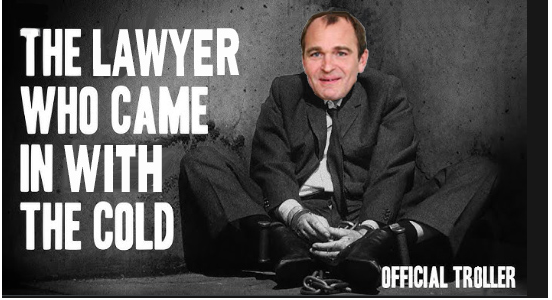
The public inquiry by Lord Anthony Hughes into the British government’s narrative of Russian chemical warfare in the UK and the alleged Novichok death of Dawn Sturgess on July 8, 2018, collapsed into secrecy, mishap, and farce in a London courtroom on Friday.
The sound system failed, leaving only one microphone to be moved from one speaker to another. The judge was invisible off camera and inaudible for the entire proceeding. A court official told the press “I personally apologies [sic] for the ongoing technical issues…The Cloud video platform equipment was tested beforehand and all was thought to be well. However there have been ongoing issues with equipment today.”
A government lawyer acknowledged that the “preliminary” security check of documents in the case is requiring reviews and approvals by five unnamed government agencies, and taking five months before the documents can be released to Hughes and to the lawyers in the case. Police and intelligence service applications to the judge to keep evidence and witness identities secret will be heard in secret. A closed-door hearing for this was expected to follow the public one on Friday, but the timing of this is a state secret the judge has not revealed.
Michael Mansfield QC, a lawyer representing the Sturgess family, said in court that four years ago, a “jigsaw of intelligence” was already available when British government officials announced the Novichok story and then charged Russian agents with the Novichok attacks. Mansfield said the delays for secrecy reviews had left the Sturgess family’s “patience [wearing] extremely thin.” He hinted that if the evidence for the Russian Novichok attack had been solid enough for public statements by Prime Minister Theresa May, her Cabinet Secretary and security advisor Sir Mark Sedwill, and then-Foreign Secretary Boris Johnson, followed by announcement of criminal charges, the Sturgess family was exasperated by four years of postponement in releasing the evidence to the public inquiry.
“Unless it’s an empty barrel”, Mansfield added. This is the first suggestion the Sturgess family has made publicly that they suspect government officials may have been lying.
Since July 8, 2018, when Sturgess was pronounced dead at Salisbury District Hospital, the government in London has replaced two coroners running the inquest into the cause of her death. Hughes, a former UK Court of Appeal judge, began hearing the case in March after the government stopped the inquest from continuing; the reason was that according to the Coroners and Justice Act of 2006, evidence and witnesses in coroner’s court must be open to cross-examination in public. Instead, the officials established what they are calling a public inquiry, according to the Inquiries Act of 2005.
The difference is a government deception operation – what is public is to be kept secret.
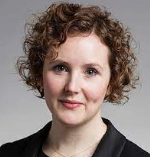 Georgina Wolfe (right), counsel for the Home Office leading the government’s presentations, told Friday’s hearing the secrecy was required in order to protect the intelligence and military information securing British lives from what she called is the threat of Russian attack. To substantiate her claim, Wolfe referred to “the Danish investigation of the MH17 attack”. She appeared to be referring to the Dutch investigation and the ongoing Dutch court trial on the shooting down of Malaysia Airlines Flight MH17, which occurred on July 17, 2014.
Georgina Wolfe (right), counsel for the Home Office leading the government’s presentations, told Friday’s hearing the secrecy was required in order to protect the intelligence and military information securing British lives from what she called is the threat of Russian attack. To substantiate her claim, Wolfe referred to “the Danish investigation of the MH17 attack”. She appeared to be referring to the Dutch investigation and the ongoing Dutch court trial on the shooting down of Malaysia Airlines Flight MH17, which occurred on July 17, 2014.
Wolfe’s mistake conceals the secret orders which have been issued in London to stop county coroner’s inquests into the deaths of British passengers who were killed on MH17; the county coroners say they have been told to delay until the Dutch trial is over. Read more here.
Jason Beer QC, the lawyer representing the Thames Valley Police in charge of the Novichok investigation, told the court that one of the priorities in the hearing will be “victim accounts” and “management of victims”. The judge then asked Adam Chapman (lead image), who was seated in court behind the police lawyer, if he had anything to say on behalf of Sergei and Yulia Skripal. They are alleged by the British government to have been the principal targets of the attack in a town square in Salisbury on March 4, 2014. The Skripals are the principal victims to have survived; in March Hughes announced they will be represented by Chapman.
The Skripals have not confirmed this. Chapman himself has refused to acknowledge that he has met or communicated with the Skripals, or knows them to have been alive when he was appointed to represent them. On his first public appearance in court, Chapman told the judge he had nothing to say.
Before the hearing Chapman had been asked by telephone and email if he would attend in person on Friday. He replied: “I do not in fact appear to have received an email from you. If you could resend it to me I will review it and then respond.” He then refused to answer.
On Friday morning, with the camera trained on the court, and Chapman visible at the far left in the rear of the room, he was asked by email: “are you present at the desk of the third row of the hearing room at the Inquiry now?” Chapman did not reply.
The Hughes Inquiry can be followed on the official website here.
This is a proceeding aimed at keeping secret the evidence for the Novichok allegations, and also the names and other details of witnesses from the police, ambulance service, intelligence agency MI6, the chemical warfare laboratory at Porton Down, and the pathologists who conducted the post-mortems on Sturgess.
On the one hand, the government’s first order to Hughes is “to conduct an investigation into the death of Dawn Sturgess in order to: (a) ascertain, in accordance with section 5(1) of the Coroners and Justice Act 2009 who the deceased was; how; when and where she came by her death; and the particulars (if any) required by the Births and Deaths Registration Act 1953 to be registered concerning the death”.
The government’s second order to Hughes is to “(b) identify, so far as consistent with section 2 of the Inquiries Act 2005, where responsibility for the death lies”.
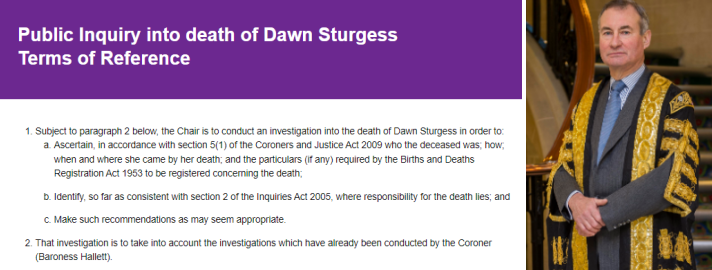
Right, source: https://www.dawnsturgess.independent-inquiry.uk/ and left, Lord Anthony Hughes, a member of the Athenaeum Club in London.
Between (a) and (b), between a legal coroner’s inquest and a legal inquiry, the secrets of British warfighting against Russia can be preserved so that even that secret can be kept secret. As Hughes and the lawyers struggled to be heard at Friday’s hearing, the secret secret was exposed by Mansfield as an “empty barrel.”
Because of the microphone and audio recording failures on Friday, the stenographic record of the hearing has been delayed in release. There is no explanation for the continuing delay in publication of the written submissions which were read out by the lawyers present. The story of Hughes’ replacement of Dame Heather Hallett as the coroner investigating the cause of Sturgess’s death can be read here.
For the full story of how British officials have tampered with the evidence of Sturgess’s death, concealed the post-mortem reports and body release and cremation certificates, and silenced testimony from the Salisbury District Hospital doctors who treated Sturgess on June 30, 2018, and the two pathologists who conducted the autopsy tests, read the book.
Chapman was on sabbatical leave from his London law firm Kingsley Napley – motto, “when it matters most” – at the same time that he was appointed by Hughes just after the last hearing on March 25.
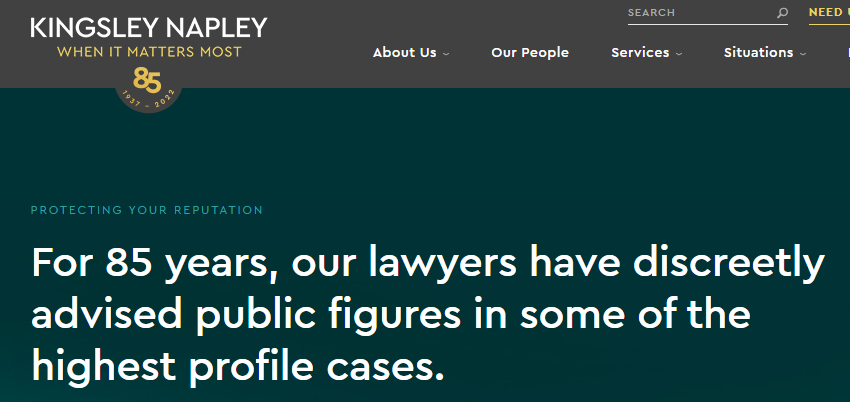
Source: https://www.kingsleynapley.co.uk/
Whether Chapman had made any contact himself with the Skripals, and how, was in doubt at the time. Chapman and two of his assistants, Jo Dorling and Katie Baker, did not respond to emails. Chapman, the assistants, and a spokesman for the Kingsley Napley firm, Michael Rosen, refused to confirm that Chapman had met with the Skripals or communicated with them in any fashion. The lawyers did not verify that either Sergei Skripal or Yulia Skripal or both of them want Chapman as their representative in the Hughes investigation; for more on the March 25 hearing, click.
Sergei Skripal has not been seen in public since the day of the first alleged Novichok attack, March 4, 2018. He has not been heard on the telephone by family members since June 26, 2019. Yulia Skripal was last seen in a British and US-directed interview at a US bomber base in May 2018; her last telephone call was heard on November 20, 2020.
The text of Hughes’s order identifying the legal representatives of the “core participants” in the inquiry lists two lawyers for each – counsel (barrister) to speak at hearings, either in public or behind closed doors; and solicitor to conduct interviews, gather evidence, prepare papers, and instruct the counsel.
The official record released on April 4 shows that an exception has been made for the Skripals. They will not be represented by a barrister. This indicates that unlike any of the others involved in the Novichok investigation, Sergei and Yulia Skripal will not testify in public themselves, nor through a lawyer.
Hughes was asked through his staff solicitor Martin Smith: “The Skripals are the only core participants to lack counsel. What is the reason for that?” “We understand that the Skripals have not yet appointed counsel,” Smith replied, “and there is no requirement for any core participant to do so.”
Hallett and her predecessor, Wiltshire County Coroner David Ridley, did not explain why they or the police working for them had not contacted or questioned the Skripals in their inquest investigations. Hughes’s public appointment of Chapman has continued the secrecy. Chapman was asked last week to say if he has communicated with the Skripals face to face, and if he and the Kingsley Napley firm have billed the Hughes Inquiry for fees for their services representing the Skripals. He and the firm have not replied. There is no independent evidence that the Skripals are alive and capable of making free judgements; there is no independent evidence of their wish to be represented by Chapman at the public inquiry.
UPDATE: An enlarged screen shot last Friday is evidence that despite his refusal to respond to press questions, Chapman was present at the hearing. Court rules do not allow press camera or audio recording during the proceeding. A half-dozen reporters registered for the video and audio feed. The press office of the inquiry released a seating plan identifying the principal participants attending in person, including Chapman. The side-by-side image that was originally part of this post was removed at the request of the court after they confirmed that this account was accurate, including in stating that Chapman was present during the hearing. One of the solicitors for the Sturgess family texted during the hearing: “although the family are noted as being present they have had 4 attempts and now cannot participate. They are my clients and the court should know.”
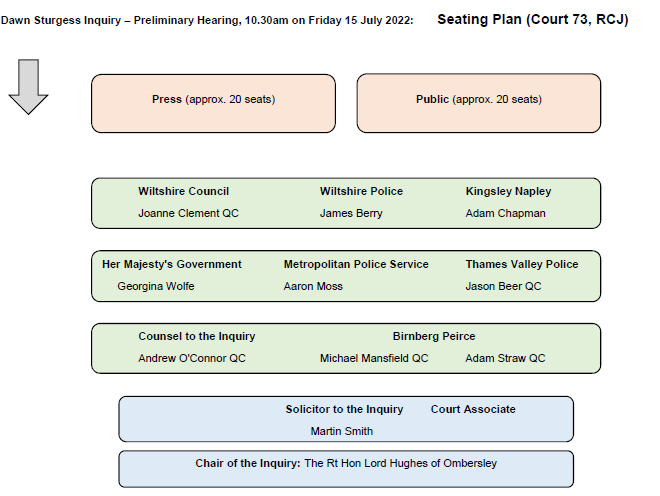
Beer for the Thames Valley Police told the hearing that a report has been compiled by the police of the timeline of events, evidence, and witnesses in the alleged attacks on the Skripals and Sturgess, and submitted to Hughes on June 24. It had been vetted by the government for release to the judge and his staff, but the report remains secret from the public. The lawyers for the Sturgess family appear not to have seen it.
A BBC reporter Tom Symonds attended the hearing by video link. In the BBC report published, he repeated the allegations of Russian involvement, and defended the government’s secrecy to substantiate them. “Lawyers for the Government and police said there were ‘special sensitivities’ which presented ‘significant challenges’ to evidence being provided. The identity and whereabouts of the suspects and the current political landscape were factors which had added to these challenges, the lawyers said.” No British publication has reported the appointment of Chapman to represent the Skripals, or verified how they instructed the lawyer to act on their behalf.
Hughes and the state lawyers agreed at Friday’s hearing there will be more open and closed-door preliminary sessions of the public inquiry, before the first public public hearing will be held. That isn’t likely for another year, they told each other.


What a tangled web we weave, when we practice to deceive. It is a shame they don’t seen to study literature over there any more.
As Lambert likes to say, kill it with fire. What a cesspool of official sleeze.
It does amaze me to imagine the salaries of all the people involved in this theater. A lot of people are doing really not very much work to go through this song and dance and not provide any actual value. I wonder what their stance is on raising the minimum wage. I do have a suspicion though!
As for kill it with fire, the body of Dawn Burgess was very hastily and conveniently cremated.
How was the Skripal’s poor cat’s body handled? If it was buried, an exhumation is in order. Unless, the Thames Valley Police claim that, by staying inside the Skripal’s dwelling after having been advised, by bullhorn one would suspect, to vacate the building and not doing so, said feline committed “suicide by cop.” Then it will be denied interrment in consecrated ground. That being so, perhap’s it now resides with the fishes along with Osama bin Laden’s body. Whose body’s autopsy was also not released.
As for “kill it with fire,” I seriously worry that the “official” miscreants will kill us all with atomic fire.
As I see it, the conduct of all the authorities in this affair could certainly qualify for the NC tag category “Ridiculously obvious scams.”
You know what the sad thing is about this saga that has wrecked all those lives? It was really a British propaganda effort whose use has already run past its use-by date. I was surprised at the time that so many western nations believed this bs but not anymore based on events in the past few months. But here is the thing. In continuing this farce, this public inquest has revealed how British law is now completely compromised and is now becoming a bad joke. The dealings that Julian Assange had with his court sessions were bad enough but this inquest is just sheer farce. If they brought back Star Chambers in the UK and made them official, I would not be surprised anymore-
https://en.wikipedia.org/wiki/Star_Chamber
what do you mean, “bring back” the Star Chamber?
who is to say it ever stopped operating? just in a more indirectly circuitous, bureaucratic technopolist, PMC way?
BoJo couldn’t get a meeting with Putin although has tried very hard (even securing a letter from queen). Kremlin’s demand is to dismiss allegation in this case. So far it seems that after BoJo is dismissed from his post, the case goes this direction and next prime minister will meet with Darth Vlad.
This miserable episode is not that hard to understand if you scrape away the accretions brought by over-excited politicians and journalists of different persuasions who have seen too many Hollywood films. It’s really a question of epistemology: what truth is, and what constitutes knowledge.
Criminal trials in Anglo-Saxon countries require proof of guilt “beyond a reasonable doubt.” This means, among other things, that evidence itself has to be respectable and have probative value, and witness statements can be and often are challenged. Most information that we come across, most of what we think we “know” doesn’t come anywhere close to this level. Rather, because we have to take decisions all the time in our lives, we go with our judgement based on the best evidence available. “Knowledge” about a job we’re applying for, a university our son or daughter may be interested in or the policies of a politicians we are thinking of supporting, is a very different issue from “knowledge” of a scientific law, still less knowledge to a legal standard of proof. Governments are in essentially the same situation, having to make decisions and judgements all the time based on limited and sometimes contradictory evidence. Sensible governments, therefore try not to make decisions or take positions on issues that they might regret later.
This was not a sensible government (remember Brexit?) It was a nervous, insecure and hopelessly divided government, grappling ineffectually with the biggest political crisis since 1945. Anything that would feed the media pack, and divert attention from the government’s problems, was welcome, and immediately seized upon. It’s entirely possible (I have no idea) that there was intelligence suggesting that the attempted poisoning was linked back to Russia in some way. It’s also possible that other intelligence suggested that the Russian government, or parts of it, was aware of the plot or had even approved of it. But a sensible government would have taken such information, evaluated it, compared it with other sources, looked at all the technical evidence, and come to a preliminary conclusion of some kind. The media absolutely required the government to say something, and in a properly functioning system, the response would have been carefully nuanced, not going beyond what could reasonably be assumed. By definition, intelligence is seldom if ever going to meet the probative standards of criminal evidence, which is why, if you look at declassified intelligence assessments, they say things like “we assess that,” or “we consider that” or “we judge that X or Y is most likely responsible.” But this was not a sensible government, and for the sake of a few headlines, and as a diversion from other troubles, they broke some of the simplest and most important rules. Now their successors have to live with the consequences. And it has to be said that, once upon a time, government officials would have stopped this kind of nonsense happening in the first place. No longer, it seems.
Albert Hastorf, for thirty years an esteemed professor, researcher and administrator at Stanford, liked to say “Conditions are never ideal, and the facts will never all be in.”
One word: Wankers.
The alliteration just cries out for release: “Wankers” a film by Wim Wenders.
He just might do the subject justice. (That will be the only justice to be seen in this case.)
“Protecting sources and methods”. Democracies will always face this age-old problem. Both technical means of gathering and interpreting information and the lives of people living in non-democracies who cooperate with democracies are at risk. And in Britain, as in the US, the legislatures and Courts are the public faces of the issue. How can we have an informed public when the information isn’t- and maybe shouldn’t be- released?
On one side there is the need for secrecy with the government saying “You need to trust us”. On the other side is the insider manipulation of this secrecy to spin a yarn, tell a false tale and to assign public “blame” to the chosen target. The insider/manipulator feels justified in the name of “The bigger picture” and prefers to ignore the long-term damage caused by the public loss of trust when some of the “We can’t tell you” stories turn out to be propaganda ploys.
I don’t have an answer. But it means that like the people I know who’ve been in a position to make a decision, NC readers shouldn’t say: “This is true” or “This is false”. They should say things like: “Based on the information I’ve seen, the shoot-down of the Malaysian plane over the Ukraine was probably done by a Russian missile being operated in the Donbas by people who apparently didn’t know it was a civilian plane. On the other hand, maybe elements within the Ukraine chose not to redirect the few civilian flights flying over the area to either use them as cover for military operations or to create an incident. But as in the case of the Korean Air plane tragically shot down over Kamchatka, we know a lot of innocent people died.”
Notice that each fact is “Subject to me getting new information” and that new information may change my conclusions or the odds that I think a particular conclusion is true.
This week I’m sitting in the LBJ Presidential archive reading formerly classified cables about Chilean elections in the 1960s. The professionals knew how limited and conflicting their information was. But they had to either make decisions or they had to accept that not making decisions was also making decisions. So, like all decision-makers, they made decisions, hoped for the best, and moved on to the next problem. In the 1965 Chilean election things worked out ok; the 1970 election led to a chain of events that didn’t work out OK. Reading the memos and information the participants had to work with is a humbling and sobering experience.
Finally, on a different note, when I read: “The Cloud video platform equipment was tested beforehand and all was thought to be well. However there have been ongoing issues with equipment today.”, I thought: “Its time we called a recess on both the technical excuses and the Court proceeding effected by the technical issues. A bad microphone hook-up is not “an equipment issue” anymore than a missile hitting a civilian plane is an “an equipment issue”. The computer didn’t eat your homework.”
One would hope that if a case is brought to court, all the evidence should be public or otherwise there’s no case – with certain issues of privacy taken into consideration (i.e. child abuse cases).
Yes, foreign agents may then be able to slip trough the holes, but that only means the counter-intelligence has to work harder to build a case with evidence they can show to the public. It’s all part of defending the democracy you live in – by actually following the rules of democracy.
If you don’t, the “bad guys” win.
Thx for including this; been following this issue for years. I rarely read John Helmer; he always has interesting info, but it’s usually wrapped in layers of squirrelly prose & random pot-shots at Russian people & institutions I’ve never heard of. This piece is clear & cogent, all the way through; was this really written by Helmer???
I’m looking forward to Craig Murray’s take on this; he’s written a lot about the Skripal “Novichok” mess, so I assume he’ll cover this new episode of the Farce, though it looks like there’s not much “there” there, just more “UK Government trying desperately to hide something, making it obvious that it has something to hide”. No wonder the Monty Python evolved on that Sceptered Isle.
“2014” in the first quote is a mistake.